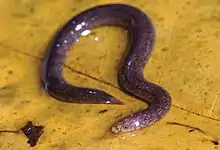Rhinatrematidae
Rhinatrematidae is a family of caecilians, also known as the Neotropical tailed caecilians, American tailed caecilians. or beaked caecilians. They are found in the equatorial countries of South America.[1][2]
| Rhinatrematidae | |
|---|---|
 | |
| Epicrionops sp. | |
| Scientific classification | |
| Domain: | Eukaryota |
| Kingdom: | Animalia |
| Phylum: | Chordata |
| Class: | Amphibia |
| Order: | Gymnophiona |
| Clade: | Apoda |
| Family: | Rhinatrematidae Nussbaum, 1977 |
| Genera | |
They are usually regarded as the most basal of the caecilian families, with numerous characteristics lacking in the other groups. For example, they still possess tails, and their mouths are not recessed on the underside of their heads. They lay their eggs in cavities in the soil. The larvae have external gills, and live in seepage areas until they metamorphose. The adults live in moist soil and leaf litter.[3]
Taxonomy
The 14 species in three genera are:[1][2]
- Genus Amazops
- Amazops amazops (Ecuador)[4]
- Genus Epicrionops
- Epicrionops bicolor (Peru, Ecuador, Venezuela, and Colombia)
- Epicrionops columbianus (Colombia)
- Epicrionops lativittatus (Peru)
- Epicrionops marmoratus (Ecuador)
- Epicrionops parkeri (Colombia)
- Epicrionops peruvianus (Peru)
- Epicrionops petersi (Ecuador, Peru, and possibly Brazil and Colombia)
- Genus Rhinatrema
- Rhinatrema bivittatum (Brazil, French Guiana, Guyana, and Suriname)
- Rhinatrema gilbertogili (Brazil)
- Rhinatrema nigrum ( Guyana, Venezuela, possibly Brazil)
- Rhinatrema ron (Brazil)
- Rhinatrema shiv (Guyana)[5]
- Rhinatrema uaiuai (Brazil)
References
- Frost, Darrel R. (2020). "Rhinatrematidae Nussbaum, 1977". Amphibian Species of the World: An Online Reference. Version 6.1. American Museum of Natural History. doi:10.5531/db.vz.0001. Retrieved 7 January 2021.
- "Rhinatrematidae". AmphibiaWeb: Information on amphibian biology and conservation. [web application]. Berkeley, California: AmphibiaWeb. 2021. Retrieved 7 January 2021.
- Nussbaum, Ronald A. (1998). Cogger, H.G.; Zweifel, R.G. (eds.). Encyclopedia of Reptiles and Amphibians. San Diego: Academic Press. pp. 54–55. ISBN 978-0-12-178560-4.
- Wilkinson, Mark; Reynolds, Robert P.; Jacobs, Jeremy F. (2021). "A new genus and species of rhinatrematid caecilian (Amphibia: Gymnophiona: Rhinatrematidae) from Ecuador". Herpetological Journal. 31 (1): 27–34.
- Gower et al. (2010) "A new species of Rhinatrema Duméril & Bibron (Amphibia: Gymnophiona:Rhinatrematidae) from Guyana"
Further reading
- Nussbaum, Ronald A. and Mark Wilkinson (1989). "On the Classification and Phylogeny of Caecilians." Herpetological Monographs, (3), 1-42
- San Mauro, Diego; David J. Gower; Oommen V. Oommen; Mark Wilkinson; Rafael Zardoya (November 2004). "Phylogeny of caecilian amphibians (Gymnophiona) based on complete mitochondrial genomes and nuclear RAG1". Molecular Phylogenetics and Evolution. 33 (2): 413–427. doi:10.1016/j.ympev.2004.05.014. PMID 15336675.
- San Mauro, Diego; Miguel Vences; Marina Alcobendas; Rafael Zardoya; Axel Meyer (May 2005). "Initial diversification of living amphibians predated the breakup of Pangaea" (PDF). American Naturalist. 165 (5): 590–599. doi:10.1086/429523. PMID 15795855.
- San Mauro, Diego; David J. Gower; Tim Massingham; Mark Wilkinson; Rafael Zardoya; James A. Cotton (August 2009). "Experimental design in caecilian systematics: phylogenetic information of mitochondrial genomes and nuclear rag1". Systematic Biology. 58 (4): 425–438. CiteSeerX 10.1.1.577.2856. doi:10.1093/sysbio/syp043. PMID 20525595.
This article is issued from Wikipedia. The text is licensed under Creative Commons - Attribution - Sharealike. Additional terms may apply for the media files.